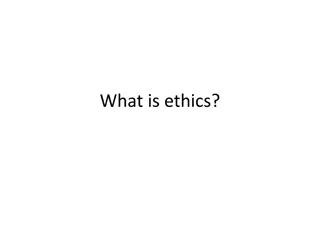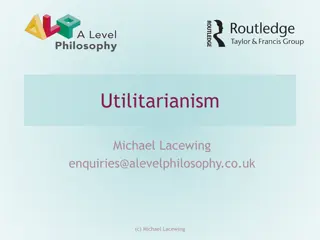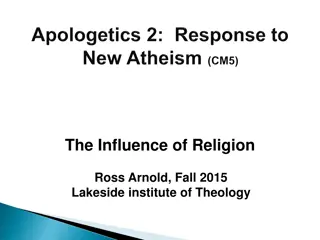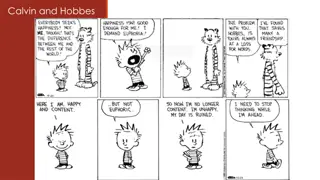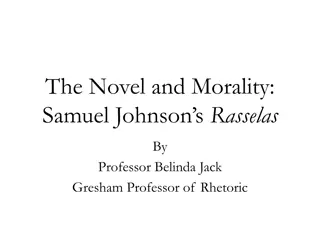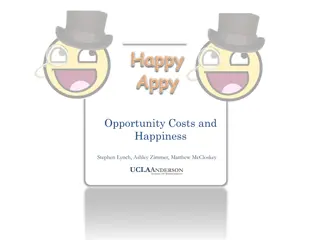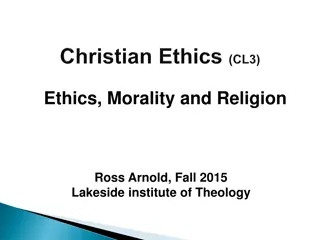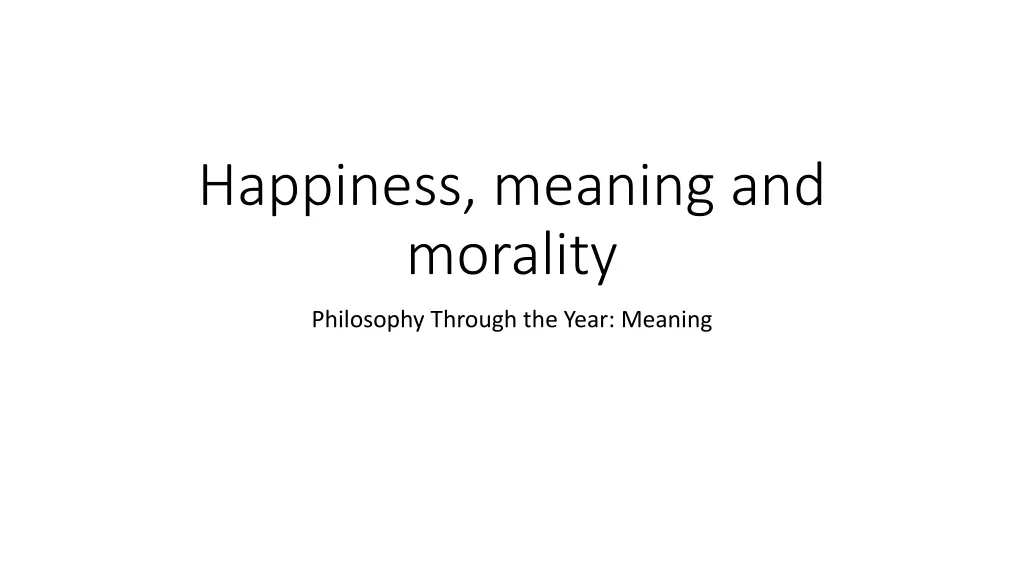
Philosophy of Happiness and Meaning
Explore the interconnected concepts of happiness, meaning, and morality in philosophy. Delve into the distinctions between fun, enjoyment, satisfaction, pleasure, and fulfillment, and contemplate the subjective nature of meaning and happiness. Consider the implications of differing perspectives on what constitutes meaning, happiness, and moral judgment.
Download Presentation

Please find below an Image/Link to download the presentation.
The content on the website is provided AS IS for your information and personal use only. It may not be sold, licensed, or shared on other websites without obtaining consent from the author. If you encounter any issues during the download, it is possible that the publisher has removed the file from their server.
You are allowed to download the files provided on this website for personal or commercial use, subject to the condition that they are used lawfully. All files are the property of their respective owners.
The content on the website is provided AS IS for your information and personal use only. It may not be sold, licensed, or shared on other websites without obtaining consent from the author.
E N D
Presentation Transcript
Happiness, meaning and morality Philosophy Through the Year: Meaning
The fun scale [Type 0 Fun: when type I fun turns into empty, compulsive pleasure.] Type I Fun: enjoyable while it s happening. Also known as, simply, fun. Type II Fun: miserable while it s happening, but fun in retrospect. It usually begins with the best intentions, and then things get carried away. Riding your bicycle across the country. Doing an ultramarathon, etc. Type III Fun: not fun at all. Not even in retrospect. Afterward, you think, What in the hell was I doing? If I ever come up with another idea that stupid, somebody slap some sense into me.
What is happiness? Consider your own understanding of the differences between: - fun - enjoyment; - satisfaction; - pleasure; - fulfilment; How does happiness relate to each of these? To which is it closest? At what point is meaning necessarily implied, or involved?
Meaning and subjectivity A common line of thought might go like this: Something (an experience, an action, etc.) is meaningful if is taken to be/experienced as meaningful by the subject; Different people take different things to be meaningful; Therefore: there can be no objective account of what is, or is not, meaningful This line of thought mirrors what could also be said of happiness, and, controversially, moral right or wrong
Meaning and subjectivity A common line of thought might go like this: An experience is a happy one if is taken to be/experienced as such by the subject; Different people find happiness in different things; Therefore: there can be no objective account of what does, or does not, make for happiness.
Meaning and subjectivity A common line of thought might go like this: An action is right or wrong if is taken to be/judged as such by the subject; Different individuals/cultures make different judgements about right and wrong; Therefore: there can be no objective account of what is, or is not, right or wrong Many of the objections to this line of thought, when applied to happiness, or moral judgement, may also apply to meaning
Pleasure, selflessness and other people So what kind of reason do we have to act so as to increase the happiness of others? The increased happiness of the greatest number only gives me a reason IF I already desire the happiness of the greatest number So the problem is that an egoist could be completely rational in seeking only their own pleasure. Henry Sedgewick (1838-1900), one of the most important Utilitarian thinkers after Mill, ends up pointing out what seems to be an impasse: the dualism of practical reason This Photo by Unknown Author is licensed under CC BY-SA
Pleasure, selflessness and other people If the intrinsic value of pleasure seems intuitively obvious, so does the difference between my own experiences and that of others: It would be contrary to Common Sense to deny that the distinction between any one individual and any other is real and fundamental, and that consequently I am concerned with the quality of my existence as an individual in a sense, fundamentally important, in which I am not concerned with the quality of the existence of other individuals: and this being so, I do not see how it is to be proved that this distinction is not to be taken as fundamental in determining the ultimate end of rational action for an individual. (Sidgwick in Schneewind 1986: 365) This Photo by Unknown Author is licensed under CC BY-SA
Pleasure, selflessness and other people So if it is not always in my own interests to promote the greatest happiness, what reasons do I have to act according to the principle of utility? Hence the dualism of practical reason: - It appears that the principle of utility (acting so as to maximise the general happiness) and rational egoism (acting prudently to maximise my own happiness) are equallyrational - But they could easily be opposed in many circumstances Utilitarianism gives rise to a very demanding ethic, but struggles to persuade us on utilitarian grounds that it is in our interests to adhere to it. This Photo by Unknown Author is licensed under CC BY-SA
Williams: Integrity and projects Williams asks us to imagine our feelings after we have made a terrible decision, that was, from the Utilitarian point of view, the right decision . What does the Utilitarian have to say about these feelings? - Should they be included within the utility calculation? - Or should they just be dismissed?
Williams: Integrity and projects In the end, Utilitarianism would seem to alienate us completely from these feelings. But this is to lose our integrity in an important way: Because our moral relation to the world is partly given by such feelings, and by a sense of what we can or cannot 'live with', to come to regard those feelings from a purely utilitarian point of view, that is to say, as happenings outside one's moral self, is to lose a sense of one's moral identity; to lose, in the most literal way, one's integrity. At this point utilitarianism alienates one from one's moral feelings [. . .] (Williams 2006: 103-4)
Williams: Integrity and projects According to Williams, Utilitarianism also struggles to make sense of the way in which we are concerned with projects that are not, themselves, aiming at happiness: Utilitarianism has a tendency to slide in this direction, and to leave a vast hole in the range of human desires, between egoistic inclinations and necessities at one end, and impersonally benevolent happiness-management at the other. (Williams 2006: 112). Some forms of Utilitarianism address this by talking about preferences , so as to allow remain neutral about what kinds of things people are interested in .
Williams: Integrity and projects But to do this involves a movement away from basic Utilitarian principles: Utilitarianism would do well then to acknowledge the evident fact that among the things that make people happy is not only making other people happy, but being taken up or involved in any of a vast range of projects, or - if we waive the evangelical and moralizing associations of the word - commitments. One can be committed to such things as a person, a cause, an institution, a career, one's own genius, or the pursuit of danger. Now none of these is itself the pursuit of happiness [. . .] Happiness, rather, requires being involved in, or at least content with, something else.
Williams: Integrity and projects [. . .] let us grant to utilitarianism that all worthwhile human projects must conduce, one way or another, to happiness. The point is that even if that is true, it does not follow, nor could it possibly be true, that those projects are themselves projects of pursuing happiness. One has to believe in, or at least want, or quite minimally, be content with, other things, for there to be anywhere that happiness can come from. Utilitarianism, then, should be willing to agree that its general aim of maximizing happiness does not imply that what everyone is doing is just pursuing happiness. On the contrary, people have to be pursuing other things. (Williams 2006: 112-3). But how can we on Utilitarian grounds decide how to weigh these projects against each other?
Gaita: The lessons of remorse Australian philosopher offers a reflection on the way that morality goes along with the sense of depth of understanding more about what it means to live and act. Suppose someone who acknowledged that his sexual morality cheapened our understanding of the meaning sexuality has in human life, but who then said that did not matter because morality is one thing, the meaning of things another. Or, someone who said I know it is sentimental and irredeemably banal, but there it is; it is my morality. The requirement that morality must at least intelligibly claim to deepen rather than cheapen our understanding of human life entails that it must offer a deepened perspective on the good and ill we suffer. (Gaita 2004: 38)
Gaita: The lessons of remorse When we ask what makes a principle a moral principle, a rule a moral rule, an obligation a moral obligation then I think we should seek at least some part of the answer in the kind of elaboration we give when we express most seriously our sense of what it means to wrong someone. Nowhere is that sense more sober than in lucid remorse. My God what have I done? How could I have done it? Those are the typical accents of remorse.
Gaita: The lessons of remorse They do not (I argue) express an emotional reaction to what one has done, but a pained, bewildered or perhaps better, incredulous realisation of the full meaning of what one has done. But now, if one puts in the mouth of the remorseful person many of the philosophical accounts of what makes an obligation a moral obligation or a principle a moral principle, of the nature of morality and of its authority, we get parody. (Gaita 2004: xxi)
Gaita: The lessons of remorse My God what I have done? I have violated the social compact, agreed behind a veil of ignorance. My God what have I done? I have ruined my best chances of flourishing. My God what have I done? I have violated rational nature in another. My God what have I done? I have diminished the stock of happiness. My God what have I done? I have violated my freely chosen principles. (Gaita 2004: xxi) So perhaps utilitarianism cannot hope to do justice to the depth we seem to encounter in moral life.
Spaemann: the antinomies of happiness For Spaemann eudaemonia is best understood in an objective sense, as a life that turns out well . But this leads to a perplexity: We would not honour someone has happy whose life project turned out well after his death, if he, having lived and worked for this one great project, died depressed thinking that he had failed, any more than we would honour someone in an unconscious state who was kept for years in a mild euphoria without contact with reality. Who would freely change places with that person? Apparently neither the subjective nor the objective viewpoint can serve to define something akin to the turning out well of life. (Spaemann 2000: 63)
Pleasure, selflessness and other people Utilitarianism suggests that happiness (conceived in terms of pleasure) is the only thing desirable for its own sake . (pleasure = the good ) This is intuitively appealing, because any particular desire that we have could be redescribed in terms of the desire for pleasure, e.g.: - Love of music = desire for the pleasure we experience when listening music; - Love of virtue = desire for the pleasure that I take in being good. And we do not need an argument to persuade us that pleasure is better than pain. But Utilitarianism claims that right action concerns itself with the pleasure of the greatest number , not just my own. But why should I value the pleasure of others? - what kind of motivation is assumed? - what reason can be given to concern oneself with the happiness of the greatest number?
Superficial and over-demanding? So we have two common sets of objections to Utilitarianism that are put from opposite sides: On the one hand, Utilitarianism fails to give sufficient depth to our moral lives: Lack of attention to the importance of integrity, projects, etc. (Williams) Reductive, superficial account of the good (Gaita on remorse); On the other hand, Utilitarianism ends up being over-demanding, or to ask us to deform our own integrity: It seems to advocate major sacrifices for the common good, which most are unwilling to make; It alienates from desires and aims which themselves seem morally significant important (Williams on projects )
References GAITA, R. (2005). Good and Evil: An Absolute Conception. London, Routledge. SIDGWICK, H., & SINGER, M. G. (2000). Essays on Ethics and Method. Oxford, Clarendon Press. SMART, J. J. C., & WILLIAMS, B. A. O. (2006). Utilitarianism For and Against. Cambridge, Univ. Press. SPAEMANN, R. (2000). Happiness and Benevolence, trans Jeremiah Aldberg, S. J. Edinburgh, T & T Clark.





